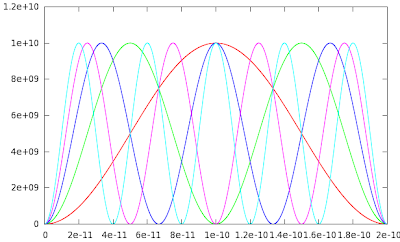So recently some people at Michigan university did some research finding that feminine maths and science role models are not inspiring. I've been wondering for a little while why the article bothers me. Perhaps it's because I exhibit most of the characteristics that they say put girls off studying STEM (science, technology, engineering, mathematics, if I recall correctly) subjects. Which is, you know, kind of sad. I would not like to think that by wearing pretty skirts and getting good marks I send out a message that other people can't . . . can't what? Do mathematics? Understand physics? That sounds plain ridiculous.
Part of it is that the study was actually fairly limited -- it only looked a middle school girls. More significantly, from what I understand, 'feminine' here means something more like 'glamourous' than, say, 'womanly'. (The introduction to the paper proper refers to "pink-laptop-toting ‘‘Computer Engineer Barbie,’’" for instance.) That's not my immediate interpretation of feminine, but perhaps it's other people's. (If you're reading this, I'd love to know what you think.) I can believe that most girls don't think they have the potential to be the real-life version of Computer Engineer Barbie. I for one don't even want to. Does that make me unfeminine?
I like pretty dresses and I have a formidable collection of hair ribbons, but I can't be bothered to go through a fifteen minute make-up routine every morning. I own pretty high heeled sandals, but I don't wear them often. For one thing they're impractical for running up to the Physics department on the second (I think that's third in the USA, where people count funny) floor of Science block. For another, I'd feel overdressed when I arrived amidst the rest of the jeans-and-sneaker-clad students. If that's unfeminine, then I guess all those conclusions about STEM-successful women being unfeminine are probably true. Only I'd be inclined to think that most women are rather unfeminine then. (In fact this is semi-almost-implied in both the press release above and the paper proper.) Motherhood certainly doesn't sound feminine by this metric, which strikes me as rather odd.
If feminine means putting a fair amount of time and effort into satisfying certain perceptions of beauty, then being feminine means having less time to be good at anything else. It also means that anyone with a different idea of what beauty is will rather dislike being labelled as feminine. It wouldn't surprise me that many women who are successful in any number of other fields qualify as 'unfeminine'. On the other hand if being feminine is simply being typically female, I don't think it's nearly as likely to scare girls away from maths and science. (Of course STEM-successful women may still be perceived as unfeminine, which is not cool, but not something I really want to get into here.)
I do think the study is interesting and even useful, but I don't like the lack of definition of 'feminine'. It seems to mean something different every time I see it, until I find myself wondering how I've ended up in a world where it's referred to as counter-stereotypical for a woman to be feminine.
Perhaps I'm overthinking things, but that does strike me as a little odd.




